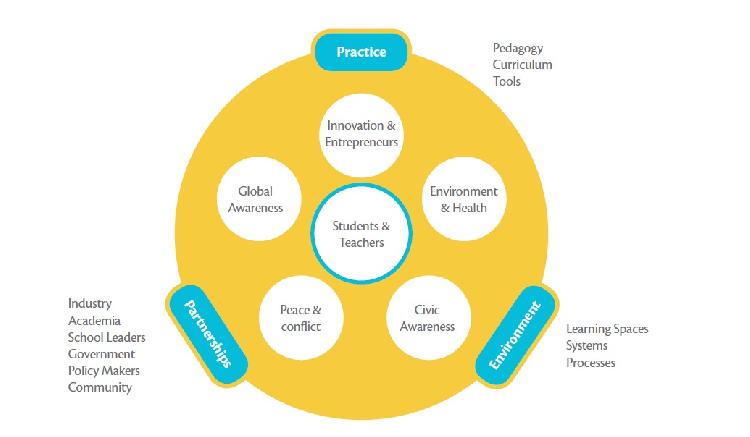
Dubai Museum of the Future Foundation joins hands with GEMS Education
Dubai Museum of the Future Foundation in cooperation with GEMS Education launched the ‘School of the Future’ report during the Global Education & Skills Forum, organised in Dubai under the patronage of His Highness Sheikh Mohammed bin Rashid Al Maktoum, Vice President and Prime Minister of the UAE and Ruler of Dubai, on 12-13 March 2016. The comprehensive report showcases the broad trends and features of schooling for the 21st century, and stresses the need to achieve a major shift in the purpose and nature of education in view of the complex realities of the modern world.
The report states that the current schools and curriculum are based on the frameworks of the 20th century requirements to prepare an industrial workforce. It points out that the 21st century, with its technological and communication innovations, is transforming the ‘factory style’ work requirements, and repetitive manual jobs are being rapidly replaced with automation. The report also highlights the need to sustain, improve and utilize the growth opportunities provided by the knowledge economy.
The report was launched in the presence of His Excellency Hussein bin Ibrahim Al Hammadi, Minister of Education, Her Excellency Jameela Al Muhairi, Minister of State for Public Education and Saif Al Aleeli, CEO of Dubai Museum of the Future Foundation, as well as to Sunny Varkey, Founder and Chairman of GEMS Education, Arne Duncan, Former Secretary of Education, United States; Andreas Schleicher, Director for Education and Skills and Special Advisor on Education Policy at the Organisation for Economic Co-operation and Development (OECD); Justine Cassell, Associate Dean, Technology, Strategy and Impact, School of Computer Science, Carnegie Mellon University; and Geoffrey Canada, founder of Harlem Children's Zone and Chair of The Education Partners Global Advisory Council.
Commenting on the report, His Excellency Mohammed Abdullah Al Gergawi, Vice Chairman of the Board of Trustees and Managing Director of Dubai Museum of the Future Foundation, said: “The world is witnessing rapid changes driven by fast-paced developments in technology and innovation. Dubai Museum of the Future Foundation is happy to join hands with GEMS Education to launch the ‘School of the Future’ report that will contribute to the strategic development of the education sector in line with the UAE’s position as a global centre of innovation and excellence. The report offers an elaborate framework for the education system of the future and will act as a catalyst to prepare the right expertise and capabilities for the knowledge economy of the 21st century.”
He added: “The launch of the report comes as part of the Dubai Museum of the Future Foundation’s efforts to create a value added knowledge content for the future. The report aims to offer a future perspective of the education sector in the short and long term to contribute to the development of strategies that support the sector in line with the Foundation’s role to develop the UAE’s strategic sectors and establish practical partnerships to achieve the goals of the future.”
Sunny Varkey, Founder and Chairman of GEMS Education, said: “We are proud to be launching the report for the ‘School of the Future’ in partnership with the Dubai Museum of the Future Foundation at Global Education & Skills Forum. However, this report must be seen as more than just a research paper. The elements of change identified in the report are important and necessary if we are to improve the state of our world through education.”
The ‘School of the Future’ report is based on three main pillars – Practice, Partnership and Environment, which are integral to functioning of each school.
The Practice pillar outlines the curriculum of the future, providing a framework for the skills and tools required by students and teachers of the 21st century. It also emphasises skills beyond the traditional 3Rs of Reading, Writing and Arithmetic to new areas such as financial and entrepreneurial education, which form key elements in the knowledge economy.
The Partnership pillar describes the relationships between schools and their stakeholders, and emphasizes on efforts to enable students to pursue their interests and passions by personalizing the learning experience. The School of the Future will enable and develop these partnerships to create a learning system that is capable of educating the citizens of the future.
The Environment pillar deals with the physical infrastructure and social systems designed to support future learners. The report states that the physical infrastructure of the schools of the future must be flexible enough to meet the needs of the students by providing spaces which allows collaboration, innovation and personalization. It also underlines the need to allow schools to rapidly respond to the growing demands of resource constraints, technology inclusion and the changing nature of learning.
The report envisions that the School of the Future will meet national requirements such as creating and sustaining a cohesive society as well as sustaining a competitive knowledge economy. It also contains insights by leading thought leaders on the role and types of learning technologies in the future, and discusses the role of design and its implications in the School of the Future. The report aims to inspire discussions and drive policy decisions on framing the educational systems of the future to serve the citizens of the 21st century.
Now in its fourth year, the Global Education & Skills Forum is convened by the Varkey Foundation to debate how education can be made everyone’s business. The Forum will feature pioneering debates and discussions led by global decision makers and experts in the field of education to explore new approaches to education and launch brand new initiatives to enhance learning opportunities around the world.




























